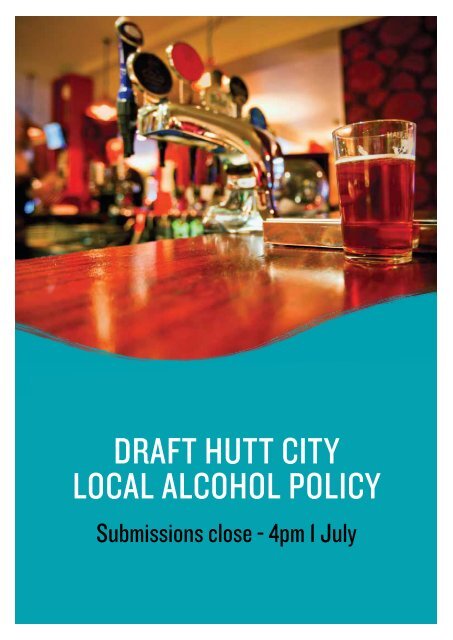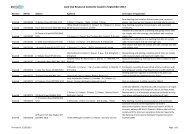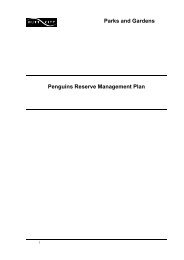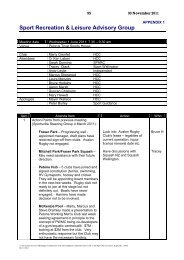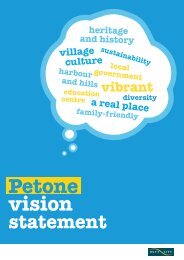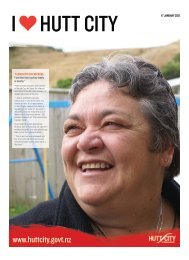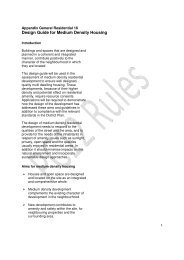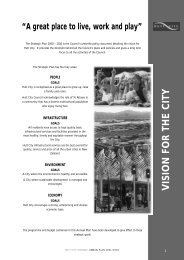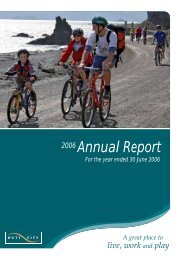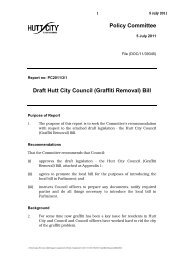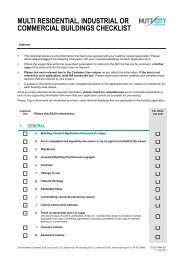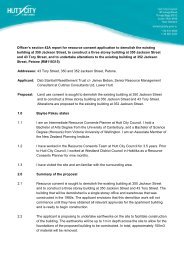DRAFT HUTT CITY LOCAL ALCOHOL POLICY - Hutt City Council
DRAFT HUTT CITY LOCAL ALCOHOL POLICY - Hutt City Council
DRAFT HUTT CITY LOCAL ALCOHOL POLICY - Hutt City Council
You also want an ePaper? Increase the reach of your titles
YUMPU automatically turns print PDFs into web optimized ePapers that Google loves.
<strong>DRAFT</strong> <strong>HUTT</strong> <strong>CITY</strong><br />
<strong>LOCAL</strong> <strong>ALCOHOL</strong> <strong>POLICY</strong><br />
Submissions close - 4pm 1 July
CONTENTS<br />
Draft <strong>Hutt</strong> <strong>City</strong> Local Alcohol Policy 3<br />
Background: Purpose and Objectives of the Sale and Supply of Alcohol Act 2012. 3<br />
Local Alcohol Policy – what is it and what needs to be considered when developing one 3<br />
<strong>Hutt</strong> <strong>City</strong> Local Alcohol Policy (LAP). 4<br />
1. Density, location, hours and one-way door policy(s) of licences 4<br />
2. Discretionary 5<br />
3. Proposed <strong>Council</strong> Discretionary Power 6<br />
Review 7<br />
Commentary 7<br />
570 6666
3<br />
Draft <strong>Hutt</strong> <strong>City</strong> Local Alcohol Policy<br />
Background: Purpose and Objectives of the Sale and Supply of Alcohol Act 2012.<br />
The Sale and Supply of Alcohol Act 2012 (the Act) puts in place a new system of control over the sale and<br />
supply of alcohol. The key characteristics of this new system are that:<br />
• it is reasonable and<br />
• the administration of the Act will help achieve the Acts objects.<br />
The objects of the Act are to:<br />
(a) ensure that the sale, supply, and consumption of alcohol is undertaken safely and responsibly;<br />
and<br />
(b) minimise the harm caused by the excessive or inappropriate consumption of alcohol.<br />
The Act has five policy objectives underpinning it. These are:<br />
• To reduce excessive drinking by adults and young people<br />
• To reduce the harm caused by alcohol use, including crime, disorder, public nuisance, and negative<br />
public health outcomes<br />
• To support the safe and responsible sale, supply and consumption of alcohol<br />
• To improve community input into local alcohol licensing decisions<br />
• To improve the operation of the alcohol licensing system<br />
Local Alcohol Policy – what is it and what needs to be considered when developing one<br />
The government wants to improve community input into local alcohol licensing decision making. Under<br />
Section 75 of the Act territorial local authorities have the discretion, to establish a Local Alcohol Policy (LAP).<br />
<strong>Hutt</strong> <strong>City</strong> <strong>Council</strong> decided at a meeting held on 26 March 2013, to establish a LAP.<br />
Section 77 of the Act prescribes what a LAP can cover. In summary these are:<br />
(a) the location of licensed premises by reference to broad areas:<br />
(b) location of licensed premises by reference to proximity to premises of a particular kind or kinds:<br />
(c) location of licensed premises by reference to proximity to facilities of a particular kind or kinds:<br />
(d) whether further licences (or licences of a particular kind or kinds) should be issued for<br />
premises in the district concerned, or any part of the district:<br />
(e) maximum trading hours:<br />
(f) the issue of licences, or licences of a particular kind or kinds, subject to discretionary conditions:<br />
(g) one-way door restrictions.<br />
These matters do not apply to special licences, or premises for which a special licence is held or has been<br />
applied for.<br />
www.huttcity.govt.nz/haveyoursay
4<br />
A local alcohol policy cannot include policies on matters unrelated to licensing.<br />
Section 78 of the Act outlines the matters that a <strong>Council</strong> must have regard to when producing a draft policy.<br />
These are:<br />
(a) the objectives and policies of its district plan;<br />
(b) the number of licences of each kind held for premises in its district, and the location and<br />
opening hours of each of these premises;<br />
(c) any areas where bylaws prohibiting alcohol in public places are in force;<br />
(d) the demography of the district’s residents;<br />
(e) the demography of people who visit the district as tourists or holidaymakers;<br />
(f) the overall health indicators of the district’s residents; and<br />
(g) the nature and severity of the alcohol-related problems arising in the district.<br />
A district’s residents include people who have holiday homes there.<br />
When producing a draft policy a <strong>Council</strong> must consult the Police, licensing inspectors, and Medical Officers<br />
of Health, each of whom must make reasonable efforts to give a <strong>Council</strong> any information they hold relating to<br />
any of the matters stated in (a) to (g) above.<br />
A workshop involving Police, licensing inspectors, Regional Public Health and the Medical Officer of Health<br />
was undertaken in March and the outcomes of this workshop reported to the <strong>Council</strong>.This information as<br />
noted above has been presented to the <strong>Council</strong> and has been considered when producing this draft LAP.<br />
The overall results of the <strong>Hutt</strong> Valley Local Alcohol Survey conducted in November- December 2012 is<br />
attached as Appendix 1. This survey was undertaken to gather evidence to assist the <strong>Council</strong> with the<br />
development of the <strong>Hutt</strong> <strong>City</strong> LAP.<br />
Attached as Appendix 2 is the timeframe <strong>Council</strong> is following to create the <strong>Hutt</strong> <strong>City</strong> LAP.<br />
<strong>Hutt</strong> <strong>City</strong> Local Alcohol Policy (LAP).<br />
1. Density, location, hours and one-way door policy(s) of licences<br />
NB: The “status quo” in respect of licensing arrangements (as noted in (a) and (b) below) comprises<br />
<strong>Council</strong>’s current Liquor Policy and the licences issued under that policy.<br />
<strong>Council</strong>’s current Liquor Policy in respect of trading hours allows for the following:<br />
On licences<br />
Lower <strong>Hutt</strong> CBD –<br />
Taverns/Hotels/Nightclubs<br />
7.00am – 3.00am the following day, Monday to Sunday<br />
Restaurants/Cafes<br />
7.00am – 1.00am the following day, Monday to Sunday<br />
570 6666
5<br />
All other areas –<br />
Taverns/Bars/Pubs/Restaurants/Cafes<br />
7.00am – 1.00am the following day, Monday to Sunday<br />
Brothels – on the condition that their on-licences are linked to the business activity of a brothel.<br />
Paris to operate Monday to Sunday 10.00am to 5.00am the following day.<br />
T.K’s to operate 24 hours a day, seven days a week.<br />
Off Licences<br />
Lower <strong>Hutt</strong> CBD and Petone<br />
7.00am – midnight<br />
All other areas<br />
7.00am - 11.00pm;<br />
a) in respect of on-licence trading hours the status quo is to remain with the exception of an<br />
8am - 1am the following day restriction in the Eastern Ward*;<br />
b) in respect of off-licence trading hours the status quo is to remain with the exception of a<br />
9am - 10pm restriction in the Eastern Ward* and a 9pm closing time in the Western Ward*;<br />
c) in respect of the location and density of on-licences and off-licences the following restrictions are<br />
to be introduced:<br />
1) a cap of two off-licences in the Eastbourne Ward*;<br />
2) a cap on off-licences, excluding the Central Commercial Area/Central Business District, in the<br />
Central Ward with only the outlets who have been granted liquor licences to remain; and<br />
3) in respect of the Eastern Ward*, in the Waiwhetu shopping area being the area between<br />
Cambridge Terrace and Waiwhetu Road on Whites Line East, off-licences allowing for the<br />
sale of wine and beer only are to be permitted;<br />
d) in respect of one-way door restrictions, the legal power to establish such restrictions across the<br />
entire <strong>City</strong> lies with the District Licensing Committee with the Police and Licensing Inspectors able<br />
to monitor and enforce such restrictions.<br />
2. Discretionary<br />
Section 77(1)(f) of the SSAA enables <strong>Council</strong> to include “the issue of licences, or licences of a particular kind<br />
or kinds, subject to discretionary conditions” in its LAP. <strong>Council</strong> currently has three policies with discretionary<br />
conditions that would be appropriate to include in the draft LAP.<br />
i) Use of <strong>Council</strong>-owned property<br />
A special Licence may be required for any private event (birthdays, concerts, company social<br />
events etc) held on <strong>Council</strong> owned property or land at which the supply and/or consumption of<br />
liquor will occur.<br />
* Refer to Appendix 3 attached which is a map showing where the Eastern, Western, Central and Eastbourne Wards are located in <strong>Hutt</strong> <strong>City</strong>.<br />
www.huttcity.govt.nz/haveyoursay
6<br />
No glassware is to be taken outside the club/building or where the event is on a grass or artificial<br />
grass surface.<br />
Plastic containers or cans must be used for any event (except when it is being served and remains<br />
within the club/building).<br />
Areas must be clearly defined, cordoned off/demarcated where liquor is being sold/consumed<br />
outside of the club/building e.g. beer tent. Where appropriate, people are to remain within the<br />
defined area.<br />
Any applicant for a Special Licence must adhere to <strong>Hutt</strong> <strong>City</strong> <strong>Council</strong> policies or bylaws regarding<br />
the use of public land.<br />
<strong>Hutt</strong> <strong>City</strong> <strong>Council</strong> Control of Liquor in Public Places Bylaw bans the possession and consumption of<br />
liquor in specific places during particular hours.<br />
The responsible use of liquor at events where liquor is permitted is to be promoted by the event<br />
organiser.<br />
ii) Licensed Outdoor Areas<br />
Holders of an On-licence can apply to use the area outside their premises on <strong>Council</strong> owned<br />
footpaths for dining and the consumption of liquor. Applicants must obtain a Street Encroachment<br />
Licence from the <strong>Hutt</strong> <strong>City</strong> <strong>Council</strong>.<br />
iii) Host responsibility<br />
<strong>Hutt</strong> <strong>City</strong> <strong>Council</strong> believes that excellence in host responsibility is fundamental to achieving the<br />
object of the Act and the intent of this policy. Applicants for new and the renewal of on, off and club<br />
licences are required to produce and supply a comprehensive host responsibility policy with their<br />
licence application, and the assurance that management will ensure that their staff are aware of<br />
and comply with their Host Responsibility policy. Generally excellence will be achieved through:<br />
• Ensuring that the overall environment of the premises and that of the area outside of the<br />
premises is conducive to preventing alcohol related harm and encouraging moderation;<br />
• Ensuring that the serving of alcohol is carried out in a responsible manner;<br />
• Ensuring under age drinking does not occur through insisting that recognised evidence of age<br />
documents are requested by the licensee and all staff;<br />
• Ensuring that patrons do not become intoxicated and where intoxicated persons do present<br />
themselves, they are not served further alcohol<br />
• Providing staff with the authority necessary to immediately respond to situations involving both<br />
under aged drinkers and intoxicated drinkers;<br />
• Ensuring door staff training is undertaken by premises with late night operating hours.<br />
• Ensuring that reasonable steps are taken to avoid the spiking of drinks;<br />
• Providing information, promoting and assisting patrons to access safe forms of transport; and<br />
• Providing staff training and on going monitoring of staff performance to support all host<br />
responsibility policies.<br />
570 6666
7<br />
3. Proposed <strong>Council</strong> Discretionary Power<br />
The <strong>Council</strong> has an Economic Development Strategy. This Strategy is primarily focused on how <strong>Hutt</strong> <strong>City</strong><br />
<strong>Council</strong> will contribute towards the sustainable economic development of <strong>Hutt</strong> <strong>City</strong> from 2009-2014. <strong>Council</strong><br />
can influence this through active intervention, leveraging off existing activities, facilitation and partnerships.<br />
Five outcomes, with strategies to achieve them, form the focus of the strategy, namely:<br />
• More business activity happening in <strong>Hutt</strong> <strong>City</strong> <strong>Council</strong> and recognition of <strong>Hutt</strong> <strong>City</strong> as a business<br />
location and vibrant city<br />
• Recognition of <strong>Hutt</strong> <strong>City</strong> as a business location and vibrant city<br />
• Continued investment in current and new business activities<br />
• An available skilled workforce<br />
• More sustainable business and economy.<br />
<strong>Council</strong> while mindful of the object of the Sale and Supply of Alcohol Act 2012, wants to ensure that<br />
economic development opportunities are not unreasonably constrained that could add to the local economy.<br />
On a case by case basis the <strong>Council</strong> proposes to establish the discretion to consider liquor licence<br />
applications that fall outside the restrictions established in the <strong>Hutt</strong> <strong>City</strong> LAP. This will enable <strong>Council</strong> to<br />
consider the economic, social and environmental factors associated with a liquor licence application and<br />
determine if a license should be permitted and subject to what conditions, if any.<br />
The criteria <strong>Council</strong> proposes to use when considering applications that fall outside the restrictions<br />
established in the <strong>Hutt</strong> <strong>City</strong> LAP are as follows:<br />
i) All such applications must relate to licensing matters pursuant to Section 77 (3) of the Sale and<br />
Supply of Alcohol Act 2013.<br />
ii) All such applications must be consistent with the objects of the Sale and Supply of Alcohol Act<br />
2013.<br />
iii) <strong>Council</strong> will consider an application for an off licence for a premises where (in the opinion of the<br />
<strong>Council</strong>) the principal business carried on is the manufacture of alcohol.<br />
iv) <strong>Council</strong> will consider an application for an off licence for a premises that (in the opinion of<br />
the <strong>Council</strong>) is a supermarket with a floor area of at least 1,000 m2 (including any separate<br />
departments set aside for such foodstuffs as fresh meat, fresh fruit and vegetables, and<br />
delicatessen items).<br />
v) <strong>Council</strong> will consider an application for an on-licence or off-licence, subject to (i) and (ii) above and<br />
if (in the opinion of the <strong>Council</strong>) such an application will add new economic value and benefit to the<br />
local economy.<br />
www.huttcity.govt.nz/haveyoursay
8<br />
Explanatory Note concerning Clause 3 (v) :<br />
Adding new economic value and benefit to the local economy does not mean that an additional bottle store<br />
or hotel, club or tavern will be issued with a liquor licence. Adding an additional liquor licence to the status<br />
quo does not in itself constitute adding new economic value and benefit to the local economy. <strong>Council</strong> will<br />
however consider the following types of licence applications pursuant to Clause 3 (v) of the <strong>Hutt</strong> <strong>City</strong> Local<br />
Alcohol Policy:<br />
• An application for an on-license if such an application is for a major conference facility or<br />
entertainment complex. Such a facility, assessed on its merits may (in the opinion of the <strong>Council</strong>)<br />
be adding new economic value and benefit to the local economy in addition to what currently exists.<br />
• An application for an off-licence if such an application has a primary focus on food (usually within<br />
a specific area/type of cuisine) and where alcohol could be sold as a complementary addition.<br />
Review:<br />
Section 97 of the Act requires a LAP to be reviewed every six years.<br />
Commentary:<br />
The following comments do not form part of the LAP. They are provided to advise readers with some<br />
answers to some frequently asked questions.<br />
1. Question: What happens when an existing liquor licence undergoes a change of ownership<br />
Answer: There is no ability under the legislation to transfer a license to a new owner. Instead, a<br />
new license will be required. The primary reason is that one of the criteria for issuing licenses is the<br />
suitability of the applicant.<br />
If a license is held by a company and there is a change to the company’s name or a change in<br />
the directors or shareholders (subject to certain qualifications), that change must be notified to the<br />
secretary of the licensing authority.<br />
2. Question: What happens when an existing liquor licence holder moves to a new location<br />
Answer: A liquor licence is site specific. Moving to a new location will require a new liquor licence<br />
to be issued for the new premises. In this instance matters that need to be considered includes<br />
noise levels, levels of nuisance and vandalism, the amenity and good order of the location.<br />
3. Question: What happens when a licensed premises needs to close to undertake earthquake<br />
strengthening<br />
Answer: An application for a temporary licence can be made to the licensing authority to authorise<br />
the sale of alcohol from another premises to enable the licensed premises to be earthquake<br />
strengthened.<br />
4. Question: Will my business hours be restricted under this LAP or the Act if I run a business selling<br />
alcohol via the internet<br />
Answer: Remote sales of alcohol (i.e. through the internet, phone or mail) can take place at any<br />
time on any day and is not restricted by the hours specified in the LAP or the Act.<br />
570 6666
9<br />
Appendix<br />
Appendix 1. 10<br />
Survey results of <strong>Hutt</strong> Valley Alcohol Survey<br />
Appendix 2. 47<br />
Time frame and steps from here to develop draft to provisional LAP<br />
Appendix 3. 48<br />
Map of <strong>Hutt</strong> <strong>City</strong> showing ward boundaries<br />
Appendix 4. 49<br />
Submission Form<br />
www.huttcity.govt.nz/haveyoursay


